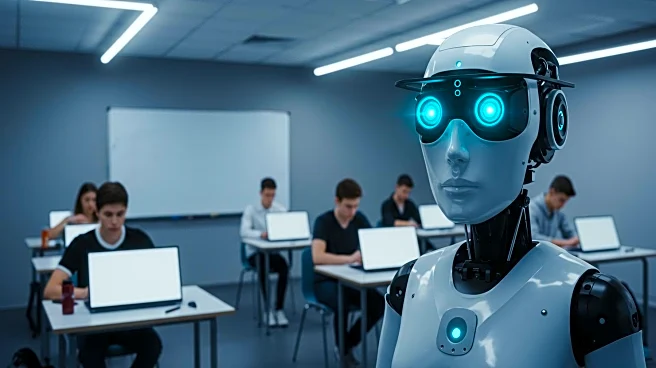What's Happening?
China has implemented a nationwide restriction on artificial intelligence during exam periods to prevent cheating among students. This move, led by President Xi Jinping, aims to enhance learning experiences by limiting reliance on AI tools. During the gaokao exams, major tech companies like Alibaba and Tencent disabled features that could assist in cheating. The decision reflects China's approach to technology regulation, prioritizing societal benefits over unrestricted tech use. Experts suggest that this strategy could offer lessons for the U.S., where AI is increasingly used by students, potentially affecting their critical thinking skills.
Why It's Important?
The restriction of AI in educational settings highlights a significant approach to technology management that could influence global educational practices. By curbing AI use, China aims to foster independent learning and critical thinking, which are crucial for academic and professional success. This contrasts with the U.S., where AI is widely used in education, raising concerns about its impact on student development. The move could prompt U.S. policymakers to reconsider how technology is integrated into education, balancing innovation with the need to maintain educational integrity and skill development.
What's Next?
The implications of China's AI restrictions may lead to increased scrutiny of AI's role in education worldwide. In the U.S., educators and policymakers might explore similar measures to ensure technology enhances rather than hinders learning. Discussions on AI regulation could intensify, focusing on creating frameworks that support educational goals while preventing misuse. As AI continues to evolve, ongoing evaluation of its impact on learning will be essential, potentially leading to new policies that address both opportunities and challenges presented by AI in education.
Beyond the Headlines
China's approach to AI regulation reflects broader themes of technological governance and societal impact. The decision to limit AI during exams underscores the importance of ethical considerations in tech use, particularly in education. It raises questions about the balance between technological advancement and preserving human skills. This development may influence global discussions on tech ethics, encouraging countries to adopt strategies that prioritize long-term societal benefits over short-term technological gains.










